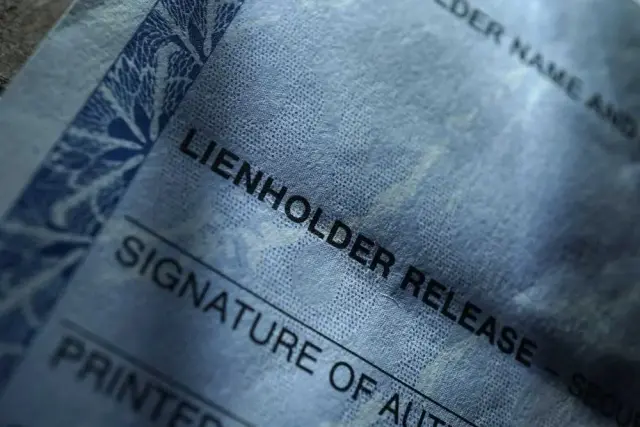Buying from a Dealership
If you’re purchasing a car from a dealership, you’ll need to pay some extra fees but you’ll be able to drive off the lot as soon as you activate insurance for the vehicle. You’ll have up to 60 days after the date of purchase to head to your local Department of Motor Vehicles (DMV) to get the car title transferred. If you wait any longer, you might have to pay late fees. When you’re ready to transfer the car title, make sure you bring the following to the DMV:
The total amount you pay on this visit to the DMV will depend on a few factors. If you purchased the vehicle out of state, you’ll be expected to pay tax on the purchase at this time. Other costs you’ll need to cover include the title transfer and state registration fees.
- The car title or manufacturer’s certificate of origin
- Proof of your insurance policy for the vehicle, which must be active
- Sales tax receipt if you purchased the vehicle in-state or a copy of the sales invoice if you purchased the vehicle out of state
- Form MVE-1, if applicable (see below)
- Form TR-212a, complete with your information
The total amount you pay on this visit to the DMV will depend on a few factors. If you purchased the vehicle out of state, you’ll be expected to pay tax on the purchase at this time. Other costs you’ll need to cover include the title transfer and state registration fees.

Buying from a Private Seller
Before buying a vehicle from a private seller, you’ll want to ask them to make sure they have the title in hand. If they have a lien against the title (e.g., a car loan), the title has been lost, or there’s someone else’s name on the title, you will want to ask them to work that out before money changes hands. Assuming the seller has all the necessary documentation, you’ll want to get the following documents in hand so you can go to the DMV and get the car title transferred to your name:
- The title of the vehicle signed and completed by the seller
- A bill of sale if there’s no room for the purchase price on the title or if you purchased the vehicle out of state
- Proof of your insurance policy for the vehicle, which must be active
- Form MVE-1, if applicable (see below)
- Form TR-212a, complete with your information. Since you won’t be paying sales tax to the private seller, you will need to cover that amount when you head to the DMV. You will also need to cover the title transfer and vehicle registration fees. Otherwise, it’s a straightforward process as long as the private seller provides all the documents and information the DMV requests.

Do I Need Form MVE-1 to Register My Car?
While Kansas does not require residents to test their vehicles for emissions levels, you may be required to have your vehicle inspected for other reasons if it meets any of the following criteria:
Regardless of how old your vehicle is, you will need to have the vehicle examined. Bring the title and bill of sale with you to a Kansas inspection station and they will return a completed version of Form MVE-1 to you.
After you have Form MVE-1, you can take that to a Kansas Highway Patrol (KHP) location for a VIN inspection, which entails a small fee. They will look at your title paperwork and the MVE-1 form and give you a pink receipt. You’ll want to take this receipt with you to the DMV.
- The vehicle’s title is from out of state
- The vehicle was purchased out of state according to its bill of sale
- The vehicle is an antique made after 1949 and it was purchased in-state
- The vehicle has a “non-highway” designation on its title or has a salvaged title, but you want to register it with a highway or rebuilt title
- You are purchasing a trailer out of state or out of country
- You are purchasing a boat trailer that exceeds 2,000 pounds and has never been titled in Kansas.
Regardless of how old your vehicle is, you will need to have the vehicle examined. Bring the title and bill of sale with you to a Kansas inspection station and they will return a completed version of Form MVE-1 to you.
After you have Form MVE-1, you can take that to a Kansas Highway Patrol (KHP) location for a VIN inspection, which entails a small fee. They will look at your title paperwork and the MVE-1 form and give you a pink receipt. You’ll want to take this receipt with you to the DMV.

Find Your Perfect Ride
Transferring your car title might sound like a big task, but it’s the last step you need to take before declaring yourself the legal owner of a new ride. But, what if you haven’t found the perfect car yet? It might be time to try out PrivateAuto to help you find the right fit. PrivateAuto offers peer-to-peer car buying and selling services along with tools to ensure a safe, stress-free transaction. Get started today!

Jacob Andra
Contributing Author
Jacob Andra is an entrepreneur, author, and technology expert living in Salt Lake City, Utah. As a stakeholder in PrivateAuto, Jacob is passionate about how our technology is bringing peer-to-peer car sales into the 21st century. When he’s not working, Jacob can be found playing pickleball, climbing mountains, or spending time with his family.
